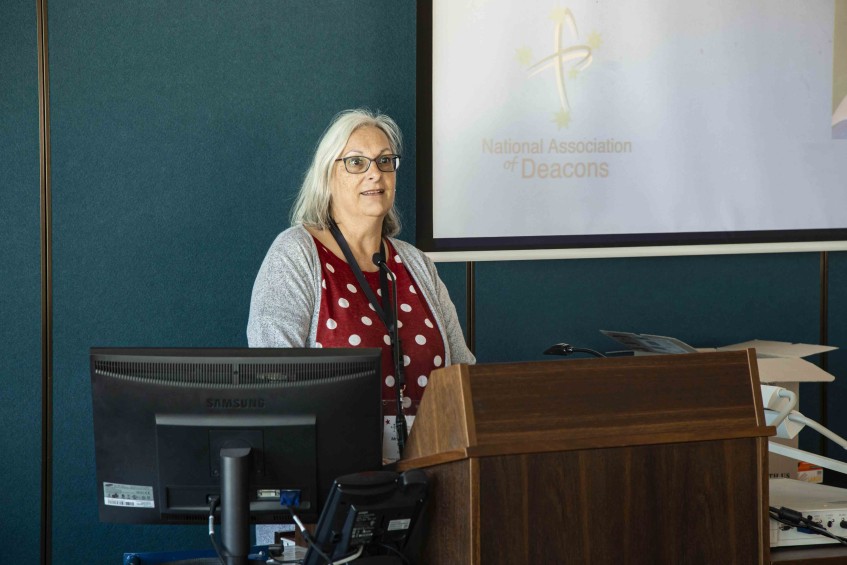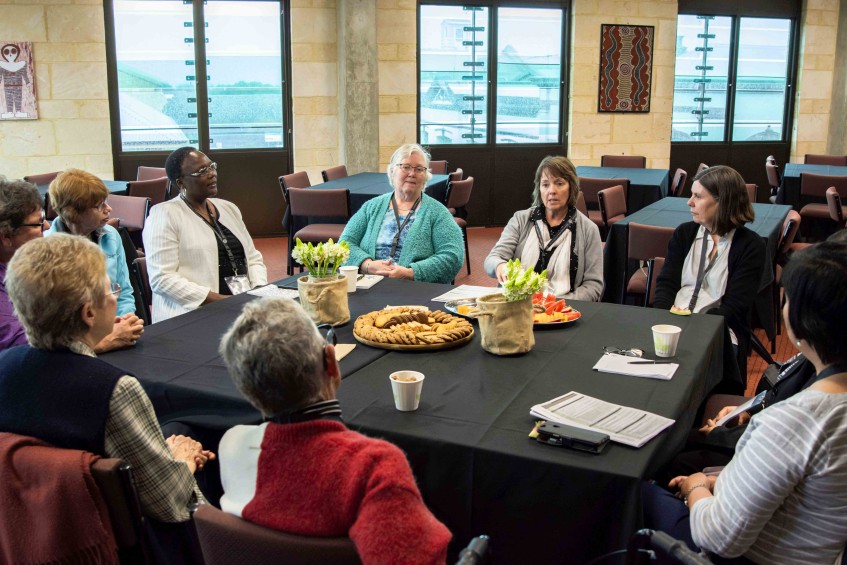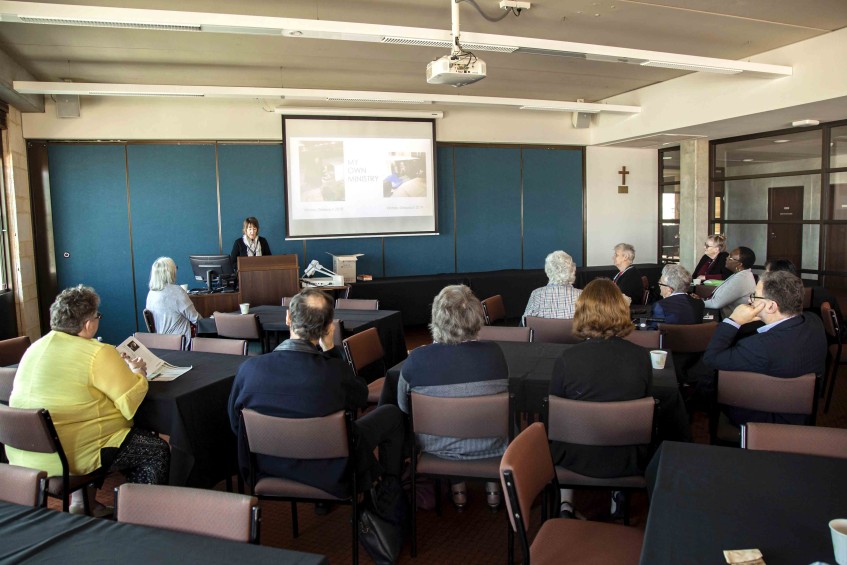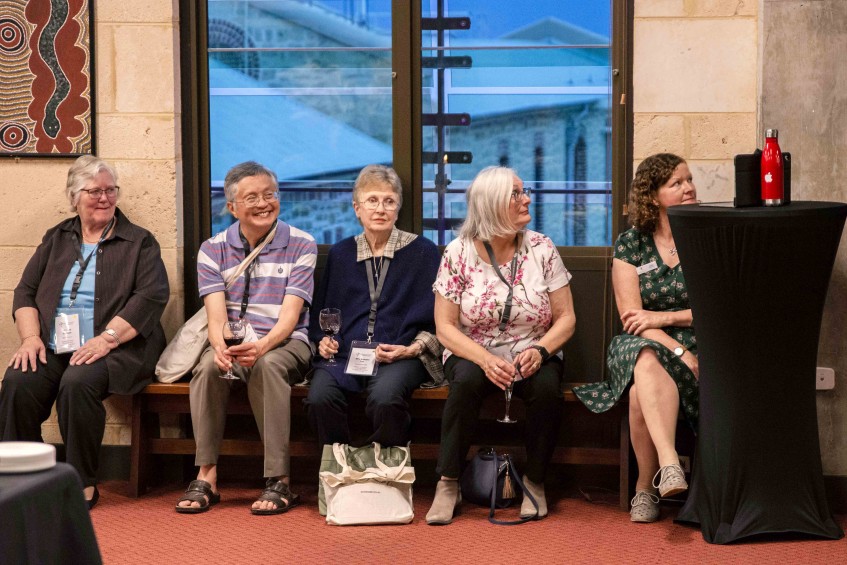Work of wives a key feature at Diaconate conference

Deborah Talbot, wife of Dcn Bruce Talbot, was one of the key speakers at the National Deacons Conference 2019. Photo: Jamie O’Brien.
By Eric Martin
For many decades Deborah Talbot, wife of Perth Deacon Bruce Talbot, has lived the rich and also spiritually challenging experience of being her husband’s helpmate in his ministry as a Permanent Deacon.
Deborah was a key speaker at the 2019 Deacon’s Conference held at the University of Notre Dame in Fremantle, from 3 to 6 October 2019, which had a special emphasis on the role of the Permanent Diaconate in supporting the Bishops: by supporting the evangelisation, pastoral care and preaching across the parishes.
The focus of the conference, ‘The Father and I are One’, highlighted the wisdom and life experience brought to the ministry by a mature married couple and the mutual support that the sacrament of marriage brings.
Deborah explained that the support provided by a Deacon’s wife is incredibly varied and does not stop for weekends or public holidays.
“We are on call 24/7, we can’t walk through the local shopping centre without being recognised,” she said. “The only time we are free from the pressures of diaconate are when we travel.
According to Deborah, the wives of the Permanent Diaconate share in their husbands’ ministry as equal partners, often taking on new challenges outside of Church based roles to ensure that their spouses are able to fulfill their duties to the parishes.
“As the Diaconate is an unpaid ministry, I had to return to full time work to support the family financially,” Deborah shared.
“However, Bruce was freed up to do the school run and be there for the children, especially as I was required to travel frequently for work. It was an old fashioned role reversal: Bruce became the stay at home dad while I worked.”

The wives of the Australian Diaconate enjoy a time of personal development and sharing at the Deacons Conference 2019. Photo: Matthew Lau.
This kind of sacrificial behavior extends to learning the many administrative skills necessary for the effective management of a parish.
“I work preparing couples for marriage, making candles for baptisms and weddings: when he ran the RCIA program in the parish I helped with preparation of materials for that; I help with putting his services together, setting up blank documents of the Rites so that his life in preparing funerals, weddings and baptisms is easier.
“I’m his sounding board for homilies and other challenges he may face.”
Deborah elaborated that although this might sound like she is just in the background, supporting Bruce administratively, nothing could be further from the truth.
“I’m currently a member of the Advisory Group for the Communications Office of the Archdiocese of Perth,” she said.
“I’ve also been involved in scribing for the Plenary Council for over a dozen sessions in our parish as well as for another parish and Catholic high school: this involved summaries of each session and submitting to the Plenary Council.
“Most recently my talents have been used as a team member for organising this conference.”

Annette Hoban, wife of Dcn Tony Hoban, spoke about her experience as the wife of a deacon. Photo: Jamie O’Brien
Similarly, the Hobans are a Catholic family, husband Tony is ordained to the Permanent Diaconate and together with wife Annette, they are responsible for an Urban Faith Community in the North-Western Sydney suburb of Marsden Park, a new residential area in one of the fastest growth corridors in Australia.
Deacon Tony Hoban, speaking on Day two of the conference, recalled that after an initial meeting with the Diocesan Director of Deacons, he returned with great excitement to tell his wife, Annette, that they would both be embarking on a mission to join the Diaconate, with the first formation meeting for them to be run the following Saturday.
“Well things got quite interesting at that point,” Tony shared with a smile.
“I’d been talking about this whole Diaconate thing for months and thought that she’d taken it on board and she’s excited about it too – turns out she was just humouring me!”
“So when I told her we’d both be involved, I suddenly had her full attention. So for her this was the start of quite a terrifying journey: because we were the first group of inquirers in the Diocese of Parramatta in many years, there were really no voices of experience we could tap into to guide us or support us,” he said.
Annette Hoban elaborated even further.
“I felt that ‘I’ had not been called to this vocation – just Tony. One of the formatters was a religious sister, Linda, and I still remember her comforting words, ‘Annette, you can be involved as little or as much as you like.’”
“I prayed and reflected, and with God again working hard to soften my heart, I surrendered. “My journey changed from that moment, and I became as involved as I possibly could.”

The Deacons Conference 2019 was an important opportunity for Australia’s deacons and their wives to gather in fellowship. Photo: Matthew Lau.
Annette went on to explain that she believes that the ordained vocation is an extension of the married vocation and that the two cannot be separated.
“The way we support each other is the same in both vocations,” she said.
Annette explained that in the early days, when Tony was still working full time and he was a ‘part-time’ deacon their local parish, she was also working and raising three children which effectively limited her physical support, even though she was able to benefit from access to the Diocesan support program.
“Support of the wives is something that we really value and follow through as important in the Diocese of Parramatta: one of the members of our formation panel has the title of Director of Spousal Support,” elaborated Tony.
“The person in that role meets regularly with the wives at each of our monthly gatherings and is also available to meet with them individually to support them pastorally.
“There are some really wonderful friendships that have grown out of these groups of wives.”
